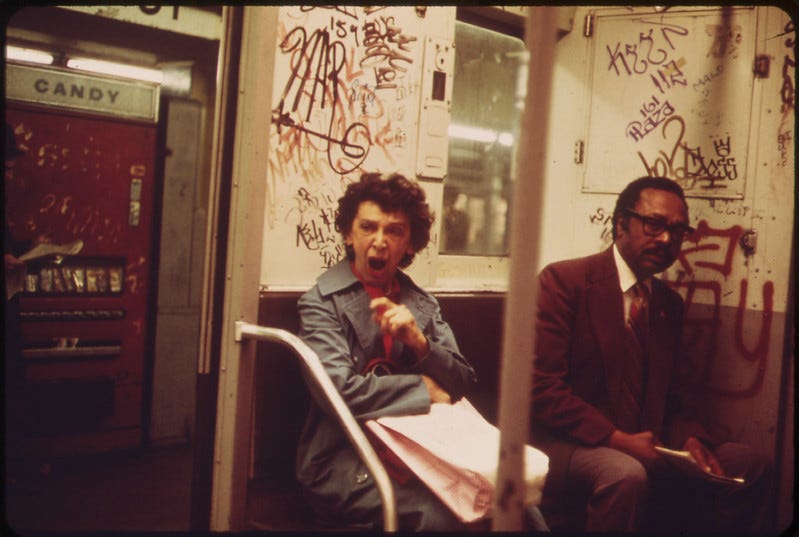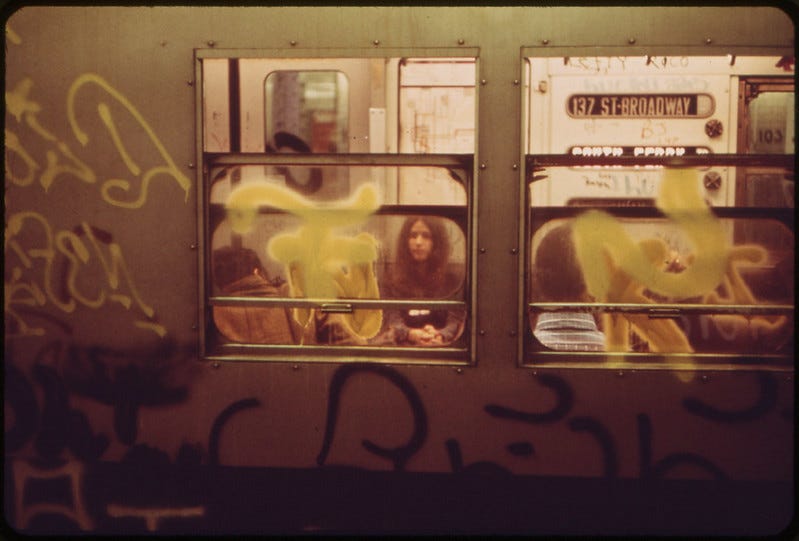I was having dinner with friends the other night, talking about what to do with the stacks of books my father and his fellow retirement home ivy leaguers wanted to donate to the home’s library. I told my friends that the woman I refer to as Julie the cruise director, whose name is not Julie, told me they had a problem with books.
“All of the residents have hundreds, if not thousands of books, and they all want to donate them to us. If we took them all we’d have to buy an enormous building just to store them.”
You mean, like, a library, I’d said?
I suggested that of all the crap we have piled up in our houses, books are the most eminently recyclable, biodegradable, and easily replaced either through purchase or through borrowing at the very places designed for such activity.
Books are heavy. They’re dusty. They take up tons of room. Information changes. Throw them out, I said. Recycle them.
Julie had looked tantalized. My friends were appalled.
When I lived in Manhattan, I took the train down from 110th street to 34th street every day, or to other destinations depending on where I was working. This was in the late 1970s, after fire had been invented, but before cell phones and e-readers, so you had limited options when it came to how to pass the time on the train.
You could look up and make eye contact with people, of course. If you were some kind of sociopath.
It was also before everyone always carried a beverage, but if you’d stopped at a bodega, you might have a no-name coffee or a Tab or Coke in your hand, and so you might stare at that til you got to your stop. You could even take the cap off the Tab and examine that in one hand as you held the bottle in the other.
I, like many people, chose to read.
Some people read newspapers, spread as wide as a cis man’s legs in mixed company, flipping pages with the necessary double hitch needed to get past the fold and the six pages between the column they were reading and the continuation of the article, somewhere past the automotive, and washer and dryer full-page ads.
Plenty of people read magazines, sold at the newsstands at the stations. Tabloids were also popular; The Weekly World News’ Bat Boy is a pale imitation of many of the alien spawn that kept us awake on the rocking, tilting rides that could alternately be careening or at a dead stop in a tunnel, with grit and paper flying by or settling around us like our fate in the dim light.

Awake was important. The subway in 1970s Manhattan was not a place where you could safely nod off. Or sit back. You for sure didn’t want to lean your head against the wall behind you. At best, your hair might stick to still-wet spray paint; at worst, to some unidentified bodily fluids left behind earlier that day. Or month. Or year.
So the common posture was upright or leaning forward with your forearms on your knees, looking at nothing, or your beverage, or your reading material. Minding your own damned business and seeing nothing.
Which is why it was sort of remarkable the morning I heard the guy next to me say, “What are you doing?”
Engrossed in my Agatha Christie, I forgot myself and looked up at him. He was dressed for the street, a guy in his early twenties, apparently on his way to his job as a killer. The woman next to him was looking at me, too.
“What am I doing?”
He nodded.
“Nothing. Just reading.”
A woman sitting across from me piped in.
“You tore the page right out of that book.”
“She did,” said the guy next to me. The woman sitting next to him continued to stare.
I sat upright a little more and looked around. More people were listening. I looked back at the guy.
“I was done with the page.” I checked to see if I’d dropped it, wondering if I’d been caught littering. I’d meant to stuff it in my pocket, as I usually did. As if littering would suddenly be an issue on the IRT.
A man sitting two people down from the woman across from me said, “You just rip the pages out when you’re done with them?”
“Yes,” I looked around. Half the train car was now engaged. “I change trains on my way to work. This way, I don’t lose my place when I close my book.”
“You should bend over the corner of the page,” said the woman across from me.
“You’re not supposed to do that,” said a teenaged girl a few seats down from her, playing with her hair.
“I do that when I’m still in the middle of it. But when I’m done with both sides of the page, I just get rid of it.”
It was silent except for the rumbling of the train.
“That’s just wrong,” said the guy next to me.
“I got it used,” I said, holding up the paperback and showing it to the train, “It was already falling apart. It was 25¢.”
“Nahhh,” he said. He turned away. I’d never felt so judged. After some communal murmuring at my inherent baseness, the rest of the crowd went back to ignoring me. It had been agreed.
I was the most deranged person on the train.
I was glad they hadn’t found out I sometimes cut books in half, or even thirds if they were too big or heavy to easily carry around. A little duct tape on the binding edge and you looked like a hero saving some well-worn tome, and not some sicko who’d recently taken a kitchen knife to a brand new copy of Trinity by Leon Uris.
Stephen King says books are “a uniquely portable magic." Not at 800 pages, they’re not. Sometimes it just makes sense to cut them up.
Or it did before Kindles and phones made everything magical and portable.
One of my dinner friends sent me this video in response to my tale.
Exactly. I really never use those wedding pearls my mother gave me. Maybe I should start renting them out for clutching.
Morning Teaistisms
It has not been the best winter for various reasons. A friend who herself had a less-than-stellar season sent me this. She really gets it.
Poetry, thy name is tea set.







I'm so glad to hear (1) that you've been an authentic Marjie Alonso since the 1970s, and (2) that you brook no nonsense about books being individual works of art that cannot be compromised.
I agree totally with you: rip them up, read them in nicely portable chunks, make papier mache from them. Use the covers to make junk journals. But don't set them in your personal library where they educate no one else. It's the intellectual's equivalent of mounted heads of hunted animals.
This is great. I get tired of book fetishism.
Years ago I worked for a collection development librarian at a university library. I was the person in charge of the disposition of donated books. It gave me a window into people's behavior, including my own, regarding books. It seems like such a win to people to donate their books to a library. But libraries have curated collections. They don't need someone's old copy of A Million Little Pieces or a whole set of the Darkover novels. So we, like most libraries, took a few into the collection, less than 5%. We threw away the worst stuff and put the stuff in the middle into a book sale. And gave people little charitable contribution letters. and then they would get pissed off when they found out their books went into a sale, even though that was in the letter.
But I do understand the urge of not wanting to *waste* a book. Certainly someone wants it! (I use Bookmooch to get rid of mine.)